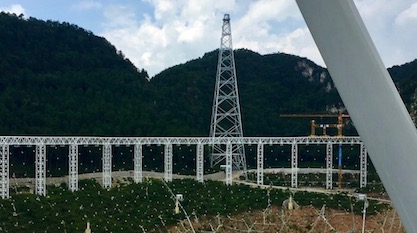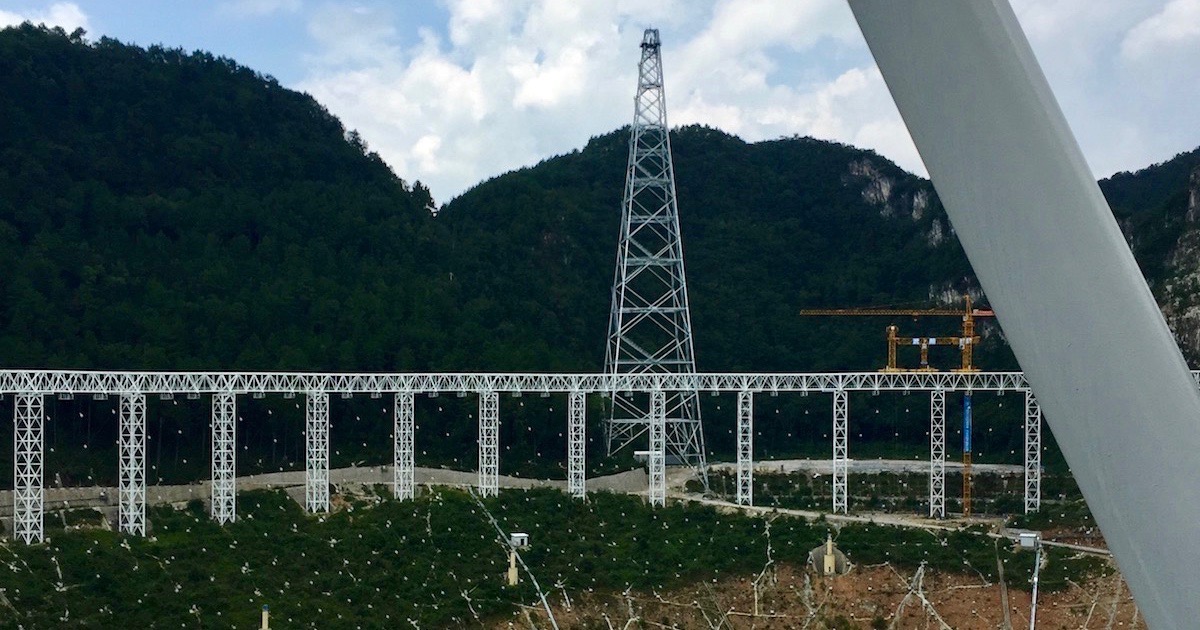 Physics, Earth & Space
Physics, Earth & Space
Another Cosmos Episode, Another Sermon from Pastor Tyson


Several themes weave their way through the current season of Cosmos, “Possible Worlds.” The careful viewer will detect at least one in each episode. They include the ideas that a modern intellectual awakening took place when science (defined as applied naturalistic philosophy) triumphed over religion and superstition; that human exceptionalism is an ancient prejudice we must abandon; and that you can find meaning in a universe without a god. Episode 7, which aired last night on Fox and National Geographic, presents the viewer with a heavy dose of the second idea.
The episode begins with Neil deGrasse Tyson walking on the perimeter of the recently completed 500-meter single dish radio telescope, FAST, in China. The episode is about the first contact with another intelligence, which many hope will be made with this telescope. But the name of the episode is “The Search for Intelligent Life on Earth.” Tyson walks down the hillside to a forest beside the telescope and describes how trees communicate with each other via their roots and fungal networks underground using chemical signals.
Anthropomorphic Language
Tyson tells us that trees can exchange information and empathy. He suggests trees can know and have consciousness. He uses highly anthropomorphic language throughout this segment. This is not presented as a controversial idea, which it certainly is. Tyson doesn’t mention that this idea comes from a book written by a German forester, The Hidden Life of Trees. There’s also an older book with similar claims called The Secret Life of Plants. Smithsonian Magazine ran a fairly balanced article on this topic in 2018. A skeptical biologist the writer interviewed had this to say about it:
It’s so anthropomorphized that it’s really not helpful. The case is overstated and suffused with vitalism. Trees do not have will or intention. What worries me is that people find this so appealing that they immediately leap to faulty conclusions. Namely that trees are sentient beings like us.
It’s ironic that Tyson, who believes in the magical powers of natural selection, shows no skepticism about this idea. He believes that natural selection can create anything, even trees with consciousness.
A segment on bee communication similarly makes heavy use of anthropomorphisms. Tyson calls Karl von Frisch’s ground-breaking work with bees the “first contact” with another intelligent species. Both these segments attempt to demonstrate that we are not exceptional. See, bees and trees can talk and empathize with each other just like us, and bees even demonstrate the value of skepticism. If only Tyson and the writers of Cosmos would look in the mirror when they say that.
Saint Charles (No Kidding)
Eventually, Tyson gets to Saint Charles. No, we mean that literally. Tyson calls Darwin “the greatest spiritual teacher of the last 1000 years.” Never mind those backwards rubes, Christian saints Thomas Aquinas and Francis of Assisi, Jewish Torah scholar Maimonides, and Muslim theologian Al Ghazali.
Other notable statements in this episode include, “Life is an emergent property of chemistry. Science is an emergent property of life. Life can begin to know itself.” Also, “Darwin debunked the story of Adam and Eve. Humans are not the kings of life, created separately and charged with its management.” Finally, “Darwin worshiped nature.”
We prefer instead our own description: Darwin was the greatest teacher of materialism since the Atomists. Tyson shows the extent to which Darwinism is a religion, not empirical science. After all, if Darwinism is the all-encompassing worldview that the Cosmos writers and host believe it to be, then it will have to completely displace any worldviews that get in its way.
For previous coverage from Evolution News of the new Cosmos season, “Possible Worlds,” see there:
- “Medicine, Religion, and Cosmos — Was Andrew Cuomo Wrong to Invoke God?”
- “Cosmos Episode 6 — That’s Entertainment! (But Is It Science?)”
- “The Biggest Myth So Far in Cosmos 3.0 — Baruch Spinoza as Science Hero”
- “New Cosmos Episodes: Only Part of the Story”
- “Counterprogramming for Cosmos 3.0: Two New Videos from Science Historian Mike Keas”
- “Cosmos 3.0 Revisits Themes of the Past, with Familiar Historical Mythmaking”
- “Cosmos 3.0 with Neil deGrasse Tyson Arrives Tonight at 8 PM, Somewhat Dented”
